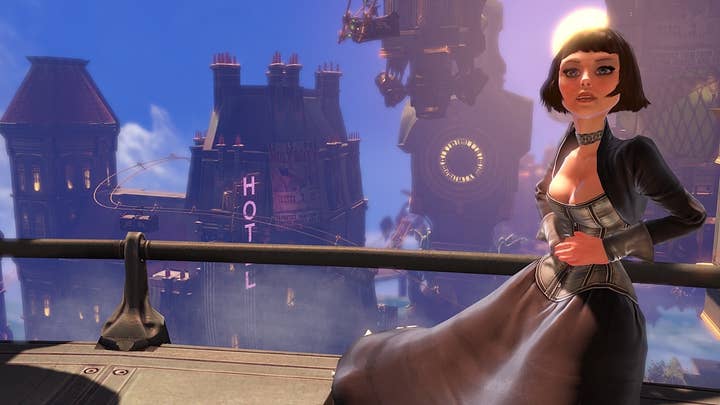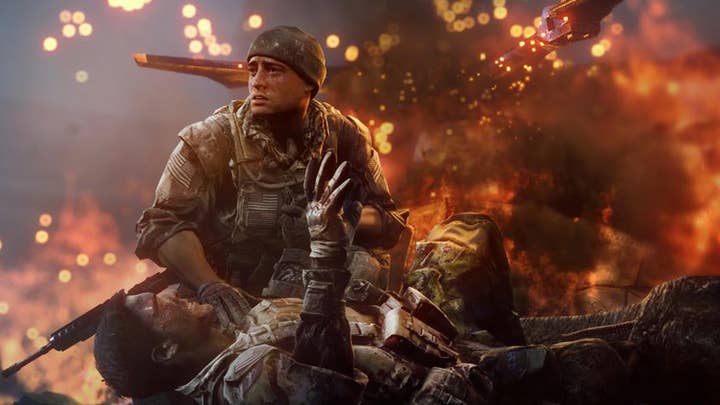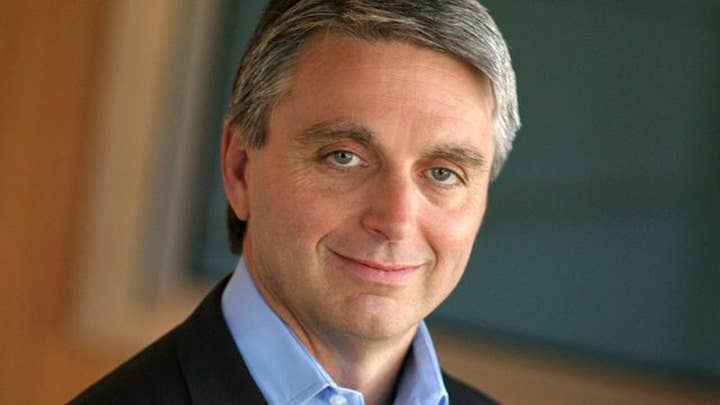John Riccitiello slams "opportunists" who just want to profit from games
In his first interview after leaving EA, JR candidly talks about next-gen, mobile, Activision, and hails BioShock Infinite and Ken Levine
Prior to his fireside chat with John Gaudiosi at Casual Connect, GamesIndustry International sat down with former EA chief executive John Riccitiello for an in-depth conversation about the continually evolving video game landscape. The CEO seat at EA is still practically warm and while Riccitiello can no longer speak for EA, it's obvious that he's enormously proud of the work he did in transforming the publisher. In fact, there were times during the interview where he slipped up and said "we" when referring to EA, only to quickly correct himself.
Perhaps what was most evident from our lengthy sit-down meeting with the industry veteran is that he remains extremely passionate about games, and in fact, he chided those who would seek to get into the business or start a company simply for the sake of making a profit.
"Let's be realistic. I'm going to be cynical for a minute. I find this terribly hilarious - you talked about game companies, things you write about on the website, these game companies who are going to create the next generation of new ideas, they're all about fun etc. And they're working on a Puzzles and Dragons rip-off, except they're going to change one of the colors to blue. I mean, wait a minute. Are you in this because you want to create something or does it look like the easiest way to make money is to take one of the top-ten games and tweak it?" he said.
"What I don't like in the games industry today is that there are too many opportunists who are there to make money"
"One of the reasons we're seeing a lot of stuff that looks alike and plays alike is because that's how a lot of stuff gets born. It gets funded that way," he continued. "I think we're going to start seeing a lot more differentiation as people get bored of seeing the same apps in the top 200. They're going to come at it and realize that if you don't make a fundamentally different product then it's very difficult to replace something that's up there with your own original design."
Riccitiello added that the reason people should get into the games industry is to see their big creative visions through - if you make something great, the profit could follow. "What I don't like in the games industry today is that there are too many opportunists who are there to make money," he said.
He noted that Zynga's new boss, Don Mattrick, who's a personal friend of Riccitiello, falls into the opposite spectrum: "I think making money is a fine byproduct when you're trying to do something great, but I don't think you do something great because you set out to get rich. I think you get rich by trying to do something great. Don fits into that category. He'll do that more than most anybody you'll ever come across."
Riccitiello also views BioShock Infinite creator Ken Levine as one of the individuals working for all the right reasons, and he believes that Levine has truly created one of the masterpieces of our era.
"Ken Levine and the world he built in Columbia is perhaps the most fully realized world ever created, in my view, in any medium since Lord Of The Rings. It is that deep and rich an interesting place. It rivals, as I say, some of the great creations of our time in any form," he said. "As a game, it's really not any different than the first BioShock game was; in fact, in some ways it's simpler... mechanically it wasn't that different. But part of what makes for great games is the concept behind it, and then sometimes what makes for great games is the mechanics. So frankly the difference between say Konami's soccer game and EA's soccer game is not the concept - the rules of soccer are pretty much laid down, it's about the craft. And the craft in AI or the 11 players on the field and the systems that are used to support it are superior in FIFA, which is why it's got a bigger market share."

It's evident from Riccitiello's passion for BioShock that he remains very much a gamer, and he's also a big believer in consoles. In fact, while some pundits have been predicting that next-gen consoles will sell only a fraction of the volume of units that current-gen has, Riccitiello sees PS4 and Xbox One sparking bigger sales overall.
"We're driven by top 50. The indie movement, I hate to say this, but you go to a lot of indie conferences and the numbers are really small. And people are doing it out of love, not business economics"
"I think they'll be bigger than the last generation, actually. The last generation can be described as supercharged engines - they had super-powerful boxes. But the entirety of the online communication and being able to connect to your friends and all that stuff, a seamless, smooth, social experience, was just masking tape - barely put together. Remember that this was eight years ago. Most people were just moving on from their 28k modems. Now these are fully functioning, fully integrated online computers connected to the best screen in your house," he noted.
Riccitiello believes that next-gen gaming will benefit not just from being more connected, but also from a greater ease of use for the average consumer. "You put a super computer under your TV, plug it in with one connection and it works. It knows who you are, it knows what your games are and it's unbelievably simple; it's not like PC plug and play, it's just plug and play. The next generation of consoles are going to be a massive improvement on user interface. So I think that 's going to matter," he said.
As much as Riccitiello loves the new consoles, he sees perhaps the biggest opportunity in mobile. But also believes the two sectors will continue to "happily coexist." Tablets in particular get Riccitiello excited.
"I think touch changed everything, I think tablets are incredible. I think they're probably... one of the best ways to game out there. I'm still a believer in the next generation of consoles but another billion and a half people came into the industry as a consequence of mobile and I think that's a pretty cool place to focus," he said. "I'm a gamer, I like games, I like people who build them, and I'm going to continue to work with them."
That said, he sees the mobile games industry as one that's got plenty of maturing ahead of it, and the game creators and publishers have much to learn.
"It's been shockingly immobile at the top. I think people expected it to work like popcorn where the bottom kernels popped up to the top and it would just be recycled this way, but for how long have we seen Candy Crush and Clash Of Clans at number one and number two? 200 days now?"
"What we are doing with mobile games today is I think we cause the user to play it almost to the point where they want to take their iPhone or iPad or their Android phone and throw it through a window, because it's like we just grind them and bleed them by either the back end or quantitative marketing. You might be happy to be lifetime revenue optimized for six months but there's a point that it gets pretty exhausting. You feel grinded, I think," he said.
Similar to his Casual Connect discussion, Riccitiello wondered aloud if mobile is really producing lasting franchises at this point: "This year EA will ship Madden 25, and franchises like The Sims and Sim City and Need For Speed and FIFA are all past the decade mark, if not approaching the 20-year mark. And they're still long lived and each successive product does better than the one that preceded it... What did they do that allowed them to have 10-year anniversaries, 15-year anniversaries and 25-year anniversaries? And do we think that there'll be 25-year anniversaries around some of the games that are chart topping in mobile?"
Riccitiello cautioned the mobile games industry that it's risking "blowing up its brands." An analogy to daytime soaps on TV was made: "They fizzle, because in a way they abuse their audience. I don't think we're at the point of abusing our audience, that's not the headline for this conversation, I just think that we need to think carefully..."

"I think there's a good question about what brands will rise and sustain. And I don't mean brands like Batman coming to mobile, I mean brands like Clash Of Clans and Camelot and Candy Crush and Puzzles & Dragons and others. Which of those will be around in a decade?" he continued. "They're going to have to come up with a different formula than I think we're seeing right now. And then secondly what skills in those companies are going to be resident in there to make that happen?"
"The industry is going to look much like it does right now but I think the challenge for mobile is going to be how to sustain a brand over the long term. How to make sure new technology enables new types of game play, not just more expensive games and more expensive to sustain games. And how to keep respecting your audience through that process."
One of the benefits of mobile and the digital revolution is that indie developers are getting more notice than perhaps ever before. It doesn't mean that these hard-working developers are able to easily make a living, however.
"We're driven by top 50. The indie movement, I hate to say this, but you go to a lot of indie conferences and the numbers are really small," Riccitiello said. "And people are doing it out of love, not business economics. And I'm in this industry for the love of it, but the fact is that the top 50 are getting bigger and bigger and bigger and I think they're going to absorb the lion's share of the business on mobile, just like they have on console and on other formats. And then the question is how do we build products that serve that intelligently? I don't know that in mobile we've got a pattern; we think we've got a pattern but we're only a few years old."
"If you think deeply about free-to-play, it's not just a business model, it's a game design. So inherent in the game is a mechanic where the management of the money or the resources that you want them to spend is fundamental to what is enjoyable to the product"
At the same time, though, Riccitiello fully admits that the nature of a hits-driven business means that the big publishers are just one or two steps away from total destruction. That's the double-edged sword of AAA.
"The consequences are huge," he remarked. "If Ubi fell on Assassin's or Activision gets the lead on shooters taken away by EA, that's going to be cataclysmic, and there's going to be huge issues there. I mean what do you think GungHo will do if Puzzles & Dragons fades?"
Speaking of Activision, it's abundantly clear that Riccitiello has enormous respect for Bobby Kotick and how Activision has managed its business. Sure, Riccitiello took a radically different approach to the business while he guided EA, but it's hard to argue with the success that Activision has had over the last generation. That said, Riccitiello fully believes that this is finally the year that Battlefield dethrones Call of Duty in the shooter market.
"There's one scenario where they ship a new MMO, it replaces WoW, Call of Duty stays at the top of the charts, Skylanders goes from strength to strength. They do a couple of things with their licenses, everything goes fine. Then there's a scenario where WoW continues to decline, Battlefield takes the mantle from CoD, Skylanders proves to be a flash in the pan and Activision proves to be a shitty company at that point. What's been fascinating watching Activision over the last few years is that I've heard that mentioned before, about them not being the company they could or should be. They've pulled off some notable successes," he acknowledged.
"The one thing I know most about now is Battlefield and CoD and I feel pretty confident that EA's got better cards. But the last billion dollar brand created from scratch in this industry was Skylanders. Is the next billion dollar brand going to come from Activision? I don't know. But if it does then they can sustain the loss of leadership in the field of shooters."

Riccitiello also seemed fascinated by the challenges ahead for Respawn and Bungie. Each developer now has the difficult task of creating yet another mega-hit, and this too will undoubtedly affect the EA vs. Activision battle.
"I like what EA's got with Titanfall. One's an ex CoD team and one's an ex Halo team. We'll see. It's actually relatively rare for a team which creates a singular hit to do it again. These things don't happen every day. No matter what the pedigree, the second hit often doesn't come," he said. "Two of the most storied teams in the history of gaming are doing that as we speak and they're using the launch of the next generation consoles to get there."
The other big issue Riccitiello weighed in on is the free-to-play market, which of course has implications for mobile as well, but Riccitiello actually doesn't believe free-to-play will ever make a huge dent on consoles. Why? Because, ultimately, free-to-play is about game design; it's not just a business model.
"I have a bucket list. It didn't include dying in place with an EA tombstone. I love the company, I love the people. They'll be fine"
"If you think deeply about free-to-play, it's not just a business model, it's a game design. So inherent in the game is a mechanic where the management of the money or the resources that you want them to spend is fundamental to what is enjoyable to the product. When you're trying to work out how far you can get in a game with a certain amount of resources, that is a game design feature. It's an enjoyable feature, the management of resources to accomplish a goal," he explained.
"If you think about BioShock, I was completely captured by Ken Levine's world. I didn't want to be interrupted to resource manage. You can do virtual items, but then it becomes something different. The majority of people who play shooters never even play the single player. What they're really doing is playing multiplayer. Core to what their definition of what makes a good multiplayer is that it's a completely level playing field. I hate to break it to you, but mobile games with microtransactions don't provide a level playing field. Unless you consider that the bag of gold I bought to offset my lack of skill is level with you because you're more skilled with your thumbs than I am," he continued. "So it's a different concept, the level of investment is different. We've already seen Battlefield premium, which was a sort of mini-subscription for a lot of added content. But I don't know if any of those games would have been anywhere near as good as they are if they were driven by microtransactions."
"My only point is that there is more to game design than resource management around the money that you put into a game. There are other things that are equally as good or better in terms of satisfying entertainment. In those circumstances, I don't think we're going to see a free-to-play model prevail."
So what's next for John Riccitiello? If we had to guess, probably something related to venture capital and mobile, but he wouldn't give us many clues. "I'm not a golfer, and I didn't leave EA to retire. I'm a little young for that... I'm working on a lot of things in the games industry right now."
What is clear, however, is that he's still a big believer in EA and he's happy with the state he's left the company in, as the publisher continues to seek out his replacement.
Reflecting on his tenure, he commented, "The transition from PlayStation to Xbox wasn't easy, fiscal 08-09. We cut two thirds of the games, we restructured the company radically, got started on digital, got started on a new brand. We built Battlefield and FIFA to billion dollar businesses and built the biggest digital business in gaming. I feel great about that. I've been working with EA since '97. In reality I don't have many friends out there. 12-13 years in one place is a long time in a man's career and I think it takes time to pass the leadership on to somebody else. We'll see who that is. I have a bucket list. It didn't include dying in place with an EA tombstone. I love the company, I love the people. They'll be fine."
Interview conducted by Steve Peterson. You should also read about Riccitiello's thoughts on game marketing at [a]list daily.

